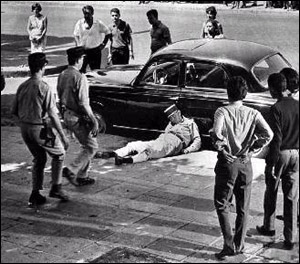skip to main |
skip to sidebar
The Battle of Algiers (La Battaglia di Algeri) ****
One thing that is amazing about La Bataglia d'Algeri (or The Battle of Algiers) is how amazingly well it lures you into caring so much exactly what happens to its Muslim Revolutionaries while giving them little to no screen time. The main character "Ali La Pointe" hardly says anything throughout the entire film, but we sit on the edge of our seats wondering what will happen to him next.
The film was made by Italian director Gillo Pontecorvo, with the enormous cooperation of the Algerian government. Pontecorvo also hired Italian composer Ennio Morricone for scoring the film's music, which is based on traditional Muslim folk songs (Pontecorvo had been impressed with Morricone's score for "A Few Dollars More") One of the main actors of the film, Saadi Yacef, essentially played himself under a different name, and was also the one who wrote the autobiographical book on which the film was based. The film was shot in documentary style black and white, hand-held looking. One of the more amazing things about this film is that not a single bit of documentary or newsreel footage was used in this film, which the credits points out. Its almost hard to believe the whole film isn't a documentary. You see shots of bombs going off at derby's that look so realistic you wonder how dangerous they are.

The film was nominated for Oscars for best director, screenplay, and foreign film. It also won the FIPRESCI prize and Golden Lion at the Venice film festival. It was banned in France upon its release (surprise!) It was screened for the Pentagon's staff in 2003 because of its uncanny parallels to the current War in Iraq.
The film follows, from 1954 to the liberation of Algeria, the attempts by the native Muslims, who are confined to their own quarter (the "Casbah"). Racism against Muslims and those of darker skin is incredibly high in Algeria, one of the films most disturbing scenes involves a shooting of a police officer. Tenants of an apartment building poke their heads out of the windows, hearing the sirens, and point at a random old Muslim beggar (who did not commit the crime) and yell "it's him! it's him!" soon it seems everyone on the street is screaming at him, yelling racial epithets, pointing at him. Terrified, the man runs for his life and is arrested by a passing police car. Reading a report on him, the police chief takes some friends with him and plants a bomb outside his wife's house in the Casbah. The blast kills many people, and the Muslim's retaliate. Three women disguise themselves as Westerers to get past the check point. Another one of the more chilling scenes involves the women, each carrying a bomb in their hand baskets, examining their would be victims. A child eating ice cream? A bunch of teenagers dancing to pop music? Relatives visiting some friends in Algeria? The film does lean towards the Muslims, probably justly so. But is mostly a non biased film that manages to play its mournful theme on the bombing of a Western café as well.

Eventually the paratroopers are brought in to crush the opposition, and the character of Colonel Mathieu is played by the only major French actor who would work on this film, Jean Martin. Martin mostly acted on stage, this was his first major film role. He was strongly against the French in Algeria and cheerfully agreed to do this film. He plays a chilling character perfectly, carefully avoiding the use of the word "torture" so his methods of interrogation don't sound too harsh.
Ever since the War in Iraq this film came out in a special 3 disc special edition DVD set, digitally remastered by Rialto, along with a booklet describing the history of the actual revolution and the making of the film. It's definitely worth buying. And the film is definitely worth seeing.




No comments:
Post a Comment